Last Saturday, Seoul held their annual Gay Pride Parade and I’m writing this to explain why it matters.
Korea is not the most open country in the world – in any sense of the term – and the society isn’t just generally reserved against homosexuality; rather all sexuality. But when the privacy of what happens in the bedroom crosses paths with fairness and equality, the rising demand for rights of the LGBT community has brought out the most ardent and offensive opponents to equality.
Last year the Parade was banned (officially) by the Seoul government at the behest of Christian protest groups. However participants went ahead anyway and marched through the streets in defiance. It was a tense and uncertain parade, albeit quite successful. This unfortunately left the LGBT community directly in the spotlight of those who were most vocally opposed, and ended up following the LGBT community right through to the elections this year.
In spring of this year, Korea impeached their president (Park Geun Hye) and in May held early elections. Tensions from corruption lead the conservative-equivalent party, the LKP: of which Mrs. Park was the leader, to have to find a scapegoat issue to rally the public around in order to regain popularity. Thus a big topic in the electoral debates ended up being about each president-elect’s position on ‘homosexuals’ (in a very broad sense of the term). Only one of the debators (Ms. Sim Sang Jung, the leader of a small independent party) was openly accepting, while the LKP came out in vehement opposition saying there should be anti-gay laws instituted. Thankfully, Mr. Moon of the DPK party won the election. However, Mr. Moon did not say anything positive in his position regarding gay rights, just that he did not believe they should be persecuted.
Then, just this month a Korean military officer was successfully convicted and jailed under military law for having had gay sex. This was a huge blow to the LGBT community. Not only does it set a dangerous precedent, but since all men in Korea must serve two years of military service or face jail time, it essentially officially makes gay sex unlawful (at least during those two years of service).
So that’s why the parade was important. A lot of bad press and sad stories really set the scene for the festival to be a volatile one. Especially since the festival was actually granted permission by Seoul City this time. There were sure to be protestors galore...which is why I made the 300km trip from my sleepy backwater town to show my solidarity.
Though Seoul is a city of 20 million+ people (including the surrounding areas), you don’t generally feel it if you’re not walking around at rush hour. I made my way on foot from Seoul Station to City Hall, where the festival was already getting going. I knew I was near, as police busses started lining up down the street and officers in bright yellow rain ponchos were milling around in groups of 10 to 50.
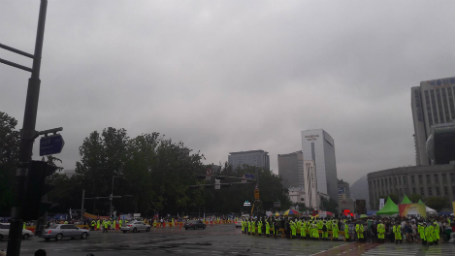
Seoul Pride 2017.
And then I got lost. “I’ll just follow the crowds” I decided, not entirely sure where the entrance was. But I didn’t realize which crowd I was following and found myself smack dab in the middle of the protest. And that’s when the true scope of things came into reality for me. I knew there would be protesters, and knowing Koreans, I knew they’d have microphones and all be chanting and preaching “Christian values” and so on…but I don’t think I really knew what a few thousand protesters would look like. But rather than turn back, I walked through. I was determined to see it all, to have my eyes opened.
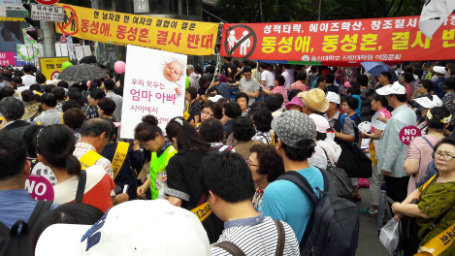
Protestors carry signs denouncing same-sex relationships.
The more I walked, the more I saw, the more I read their signs and listened to their preaching – read: threats – the more discomforted and depressed I became. The protesters had brought their kids too, some very young, some teenage. I felt horrible seeing the future generation being exposed and indoctrinated to such hate. Having grown up in a very open, warm, and kind household in a relatively open and accepting society and surrounded myself with people who didn’t care what my sexuality was. This was my first time to be smack in the middle of it, and experience what others who are not so fortunate as myself often have to go through daily.
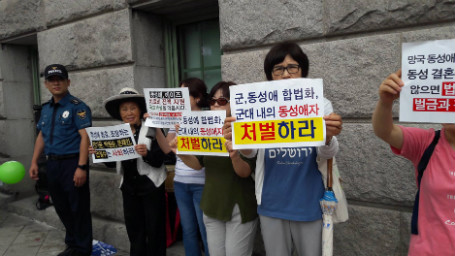
Protestors encourage military witch hunt of homosexuals.
It was loud. Drums from protestors in traditional clothes echoed off buildings; hand-held megaphones from milk-crate preachers grated at my ears; loud-speakers from the church-organized protests reverberated under my feet; and people shouted their own protests and chattered away in the shoulder-to-shoulder crowds surrounding the event.
And when I finally found my way into the festival compound, it was louder. They had the speakers pushed up to full volume and the base shook my insides…but suddenly, I couldn’t hear the protesters anymore, and I couldn’t see them or care less. The whole atmosphere had changed. And even though there were occasional down-pours of rain (it is Typhoon season, after all), the weather that would hamper an event at any other time of the year, served to keep everyone cool instead of dying in 30c heat and 99% humidity. Some people danced in the rain, some coupled up and cuddled under one umbrella, and old ladies wandered the crowd selling disposable ponchos.
I was early though, and I noticed the crowd, though big, wasn’t looking much bigger than the protest-crowd outside. Moreover, I noticed the lack of diversity among the people at the pride festival. They seemed to be almost entirely between the age of 18 and 30, though my friend noted that she was pleased to see so many women in attendance compared to back in the U.S. I told myself it’s probably the rain. Or I’m just too early. Or …?
Both. It was both. When the parade finally got under way two hours later, the crowds had begun to pack in. We were sardines in a tin can, but thankfully the rain had let up, so we weren’t all fighting for umbrella space too. Suddenly, I started to notice what I didn’t see before: older people. And when the procession broke out into the 8-lane streets of downtown Seoul, we could finally spread out a bit, and I could see the scope of the parade. I won’t lie, I teared up a bit.
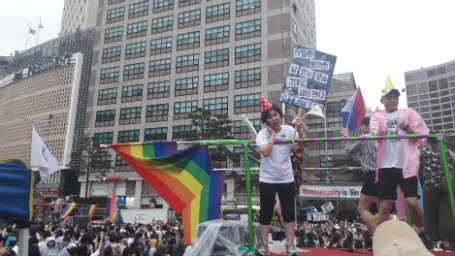
A pride attendee carries a sign saying ‘Mom loves you just the way you are.”
After having walked through several thousand people shouting hatred and fear-inducing phrases, and then the disappointment I had felt when I thought the parade would be not much larger than the protest, seeing all those people filled my heart with a renewed sense of hope. My spirits lifted and I was able to fully appreciate and enjoy every moment of the 3km walk through the streets of Seoul. We danced along to the music from the few floats that lead the way and waved flags as the few onlookers waved, smiled bemusedly, and stared in confusion.
Unlike other cities, there were no crowds of watchers. There were only marchers and protesters (and the people who had no idea that would be a parade at all and just happened upon us). And I suppose in a way, both of our communities felt a stronger bond for it. In other places, Pride Parades are gawk-fests of people dressed absurdly or doing some strange attention-getting action or not dressing in anything at all! But here in Korea, Pride is a much more pure and encouraging event, where they are still fighting for basic rights and acknowledgement and acceptance. People were there to show support, and rather that do so by watching, they all did so by participating.
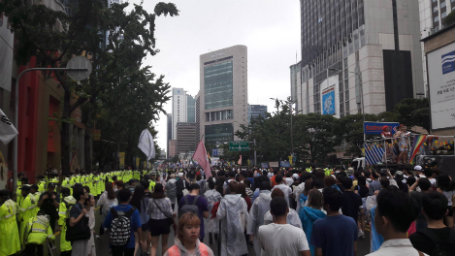
Police line the pride march route.
In all, 85,000 people turned up that day. It wasn’t just a record breaking number, but also a great display of the changing attitudes of people. Even if what we read in the news sounds horrible, and the people on the side of the road with a megaphone are loud, Saturday I learned that those people are the minority. They’re loud; they cause a scene; they make newsworthy headlines. But most people aren’t like that, even here in a country both steeped in “traditional values” and “Christian conservativism”.











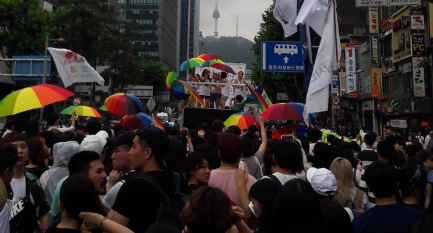
 Printable Version
Printable Version














Reader's Comments
a few fact checks by the way:
a. "Last year the Parade was banned (officially) by the Seoul government at the behest of Christian protest groups."
Last year's Seoul Queer Festival did take place with permission, with Seoul Central District Court dismissing a petition filed by a Christian party at the last minute: http://www.asiaone.com/asia/thousands-march-through-central-seoul-pride-parade
b. "Mr. Moon did not say anything positive in his position regarding gay rights, just that he did not believe they should be persecuted."
Mr. Moon initially said that he didn't like homosexuality and should be banned in the army (thus supporting the persecution) during the debate, where he also made it very clear he's against marriage equality. So he didn't take a neutral-ish stance on the issue but actively opposed it although he moderated his wording (but not his stance) followed by the outcries: https://www.irishtimes.com/news/world/asia-pacific/south-korea-convicts-army-captain-for-gay-sex-1.3094677
c. "it essentially officially makes gay sex unlawful (at least during those two years of service)."
Gay sex is already unlawful by the military criminal code. The army's move wasn't about whether to make gay sex unlawful or not but rather to show the army can execute the 1962 Military Criminal Act's Article 92-6, which the country's Constitutional Court has upheld in the past, if they wanted to. But it would be worth mentioning that the army violated the criminal code themselves in the process of the witch-hunting by entrapment, elicitation etc.: http://edition.cnn.com/2017/05/01/opinions/south-korea-military-sodomy-law/index.html
a) My mistake. I actually wasn't in Korea for last pride >_> I didn't realise it was given the official go-ahead in the end.
b) I watched his commentary during the electoral debates. I didn't think it was as negative as everyone else was making it seem. (the link you sent is post-election)
c) Again, my poor wording. I meant, this ruling really does make homosexuality illegal within the country, because all men are forced to be in the military, but the military can prosecute them.
And yeah, I know about the witch-hunt the military is on now :(
I hope for this in the future.
Please log in to use this feature.